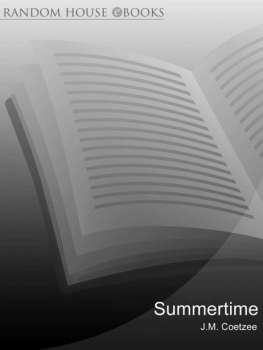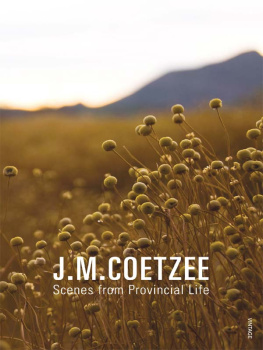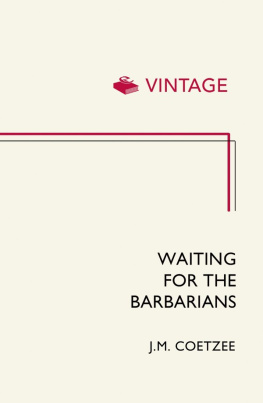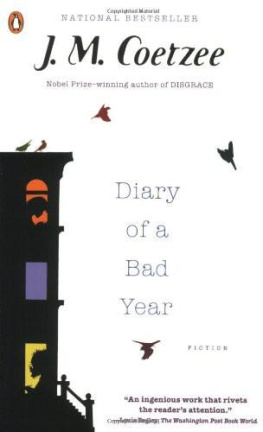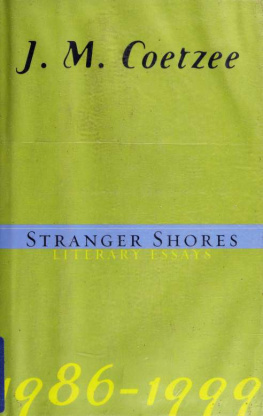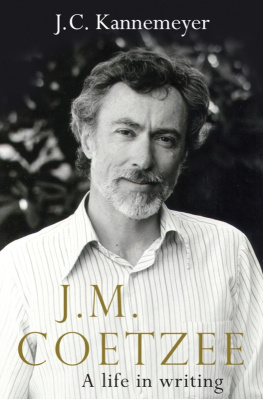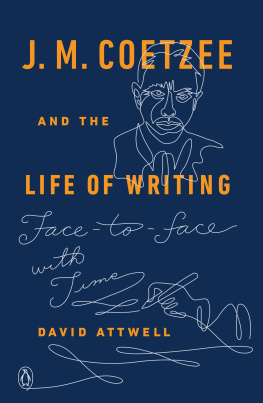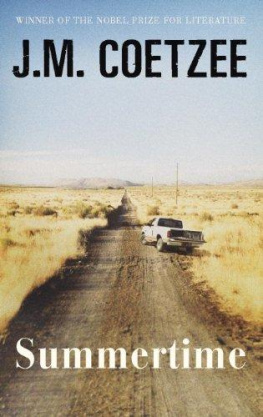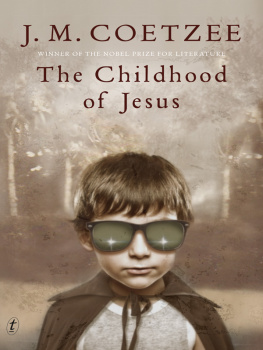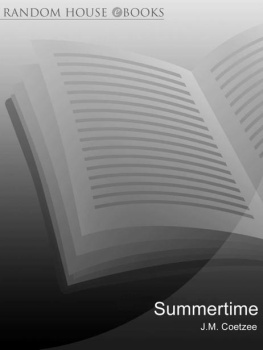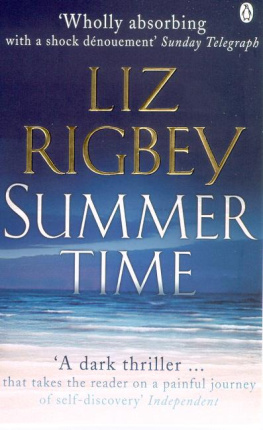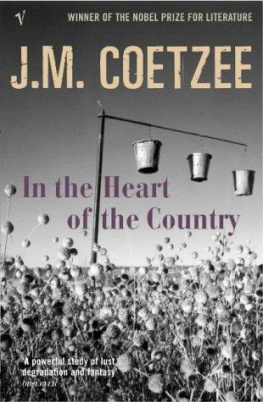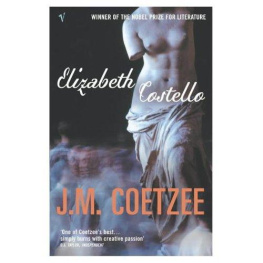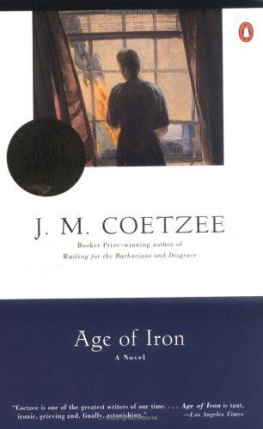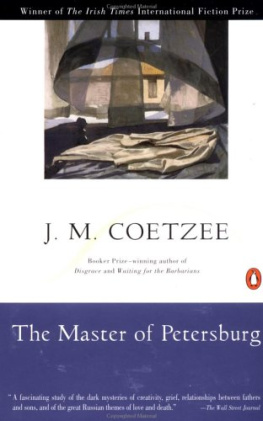Coetzee - Summertime
Here you can read online Coetzee - Summertime full text of the book (entire story) in english for free. Download pdf and epub, get meaning, cover and reviews about this ebook. year: 2009, publisher: CCV Digital, genre: Detective and thriller. Description of the work, (preface) as well as reviews are available. Best literature library LitArk.com created for fans of good reading and offers a wide selection of genres:
Romance novel
Science fiction
Adventure
Detective
Science
History
Home and family
Prose
Art
Politics
Computer
Non-fiction
Religion
Business
Children
Humor
Choose a favorite category and find really read worthwhile books. Enjoy immersion in the world of imagination, feel the emotions of the characters or learn something new for yourself, make an fascinating discovery.
- Book:Summertime
- Author:
- Publisher:CCV Digital
- Genre:
- Year:2009
- Rating:4 / 5
- Favourites:Add to favourites
- Your mark:
- 80
- 1
- 2
- 3
- 4
- 5
Summertime: summary, description and annotation
We offer to read an annotation, description, summary or preface (depends on what the author of the book "Summertime" wrote himself). If you haven't found the necessary information about the book — write in the comments, we will try to find it.
Summertime — read online for free the complete book (whole text) full work
Below is the text of the book, divided by pages. System saving the place of the last page read, allows you to conveniently read the book "Summertime" online for free, without having to search again every time where you left off. Put a bookmark, and you can go to the page where you finished reading at any time.
Font size:
Interval:
Bookmark:

SUMMERTIME
Scenes from Provincial Life
ALSO BY
J.M. Coetzee
Dusklands
In the Heart of the Country
Waiting for the Barbarians
Life & Times of Michael K
Foe
White Writing
Age of Iron
Doubling the Point: Essays and Interviews
The Master of Petersburg
Giving Offense
Boyhood: Scenes from Provincial Life
The Lives of Animals
Disgrace
Stranger Shores: Essays 19861999
Youth
Elizabeth Costello
Slow Man
Inner Workings
Diary of a Bad Year
J.M. Coetzee
SummertimeScenes from Provincial Life

This eBook is copyright material and must not be copied, reproduced, transferred, distributed, leased, licensed or publicly performed or used in any way except as specifically permitted in writing by the publishers, as allowed under the terms and conditions under which it was purchased or as strictly permitted by applicable copyright law. Any unauthorised distribution or use of this text may be a direct infringement of the author's and publisher's rights and those responsible may be liable in law accordingly.
ISBN 9781409088622
Version 1.0
www.randomhouse.co.uk
Published by Harvill Secker 2009
2 4 6 8 10 9 7 5 3 1
Copyright J.M. Coetzee 2009
J.M. Coetzee has asserted his right under the Copyright, Designs and Patents Act 1988 to be identified as the author of this work
This electronic book is sold subject to the condition that it shall not by way of trade or otherwise, be lent, resold, hired out, or otherwise circulated without the publisher's prior consent in any form other than that in which it is published and without a similar condition including this condition being imposed on the subsequent purchaser
First published in Great Britain in 2009 by
HARVILL SECKER
Random House, 20 Vauxhall Bridge Road
London SW1V 2SA
www.rbooks.co.uk
Addresses for companies within The Random House Group Limited can be found at: www.randomhouse.co.uk/offices.htm
The Random House Group Limited Reg. No. 954009
A CIP catalogue record for this book is available from the British Library
ISBN: 9781409088622
Version 1.0
Grateful thanks to Faber and Faber Ltd and the estate of Samuel Beckett for permission to quote from Waiting for Godot
My thanks to Marilia Bandeira for assistance with Brazilian Portuguese, and to the estate of Samuel Beckett for permission to quote (in fact to misquote) from Waiting for Godot.
Notebooks 19727522 August 1972
IN YESTERDAY'S Sunday Times , a report from Francistown in Botswana. Sometime last week, in the middle of the night, a car, a white American model, drove up to a house in a residential area. Men wearing balaclavas jumped out, kicked down the front door, and began shooting. When they had done with shooting they set fire to the house and drove off. From the embers the neighbours dragged seven charred bodies: two men, three women, two children.
The killers appeared to be black, but one of the neighbours heard them speaking Afrikaans among themselves and was convinced they were whites in blackface. The dead were South Africans, refugees who had moved into the house mere weeks ago.
Approached for comment, the South African Minister of Foreign Affairs, through a spokesman, calls the report 'unverified'.
Inquiries will be undertaken, he says, to determine whether the deceased were indeed South African citizens. As for the military, an unnamed source denies that the SA Defence Force had anything to do with the matter. The killings are probably an internal ANC matter, he suggests, reflecting 'ongoing tensions' between factions.
So they come out, week after week, these tales from the borderlands, murders followed by bland denials. He reads the reports and feels soiled. So this is what he has come back to! Yet where in the world can one hide where one will not feel soiled? Would he feel any cleaner in the snows of Sweden, reading at a distance about his people and their latest pranks? How to escape the filth: not a new question. An old ratquestion that will not let go, that leaves its nasty, suppurating wound. Agenbite of inwit.
'I see the Defence Force is up to its old tricks again,' he remarks to his father. 'In Botswana this time.' But his father is too wary to rise to the bait. When his father picks up the newspaper, he takes care to skip straight to the sports pages, missing out the politics the politics and the killings.
His father has nothing but disdain for the continent to the north of them. Buffoons is the word he uses to dismiss the leaders of African states: petty tyrants who can barely spell their own names, chauffeured from one banquet to another in their Rolls- Royces, wearing Ruritanian uniforms festooned with medals they have awarded themselves. Africa: a place of starving masses with homicidal buffoons lording it over them.
'They broke into a house in Francistown and killed everyone,' he presses on nonetheless. 'Executed them. Including the children. Look. Read the report. It's on the front page.'
His father shrugs. His father can find no form of words spacious enough to cover his distaste for, on the one hand, thugs who slaughter defenceless women and children and, on the other, terrorists who wage war from havens across the border. He resolves the problem by immersing himself in the cricket scores. As a response to a moral dilemma it is feeble; yet is his own response fits of rage and despair any better?
Once upon a time he used to think that the men who dreamed up the South African version of public order, who brought into being the vast system of labour reserves and internal passports and satellite townships, had based their vision on a tragic misreading of history. They had misread history because, born on farms or in small towns in the hinterland, and isolated within a language spoken nowhere else in the world, they had no appreciation of the scale of the forces that had since 1945 been sweeping away the old colonial world. Yet to say they had misread history was in itself misleading. For they read no history at all. On the contrary, they turned their backs on it, dismissing it as a mass of slanders put together by foreigners who held Afrikaners in contempt and would turn a blind eye if they were massacred by the blacks, down to the last woman and child. Alone and friendless at the remote tip of a hostile continent, they erected their fortress state and retreated behind its walls: there they would keep the flame of Western Christian civilization burning until finally the world came to its senses.
That was the way they spoke, more or less, the men who ran the National Party and the security state, and for a long time he thought they spoke from the heart. But not any more. Their talk of saving civilization, he now tends to think, has never been anything but a bluff. Behind a smokescreen of patriotism they are at this very moment sitting and calculating how long they can keep the show running (the mines, the factories) before they will need to pack their bags, shred any incriminating documents, and fly off to Zrich or Monaco or San Diego, where under the cover of holding companies with names like Algro Trading or Handfast Securities they years ago bought themselves villas and apartments as insurance against the day of reckoning ( dies irae, dies illa ).
According to his new, revised way of thinking, the men who ordered the killer squad into Francistown have no mistaken vision of history, much less a tragic one. Indeed, they most likely laugh up their sleeves at folk so silly as to have visions of any kind. As for the fate of Christian civilization in Africa, they have never given two hoots about it. And these these! are the men under whose dirty thumb he lives!
Font size:
Interval:
Bookmark:
Similar books «Summertime»
Look at similar books to Summertime. We have selected literature similar in name and meaning in the hope of providing readers with more options to find new, interesting, not yet read works.
Discussion, reviews of the book Summertime and just readers' own opinions. Leave your comments, write what you think about the work, its meaning or the main characters. Specify what exactly you liked and what you didn't like, and why you think so.

